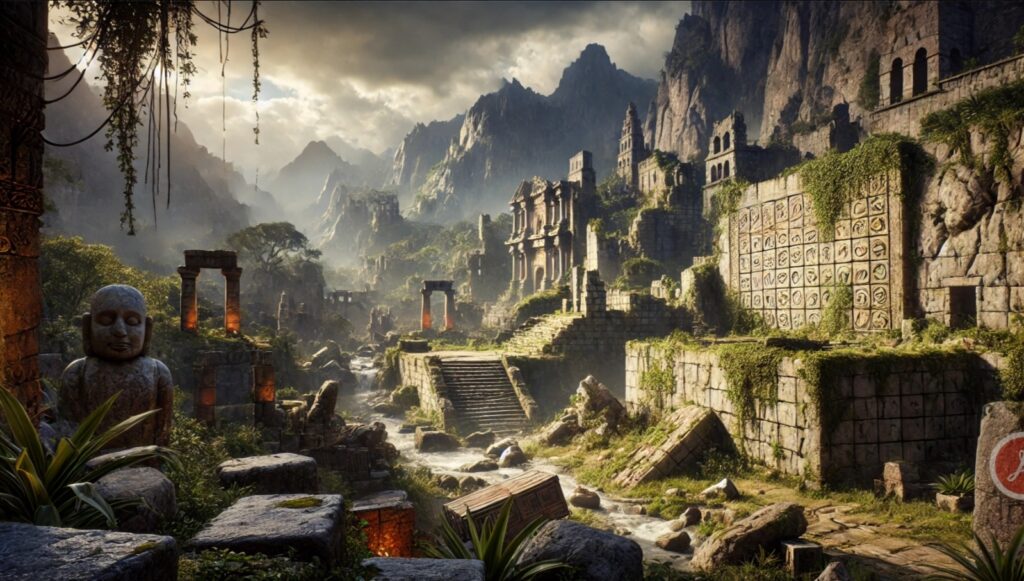Throughout history, civilizations have risen and fallen, leaving behind remnants of their once-thriving societies. Some cities were buried beneath volcanic ash, others were swallowed by the sea, and many were simply abandoned and lost to time. These lost cities continue to fascinate archaeologists and historians, offering glimpses into the past and fueling countless myths and legends. This article explores some of the most intriguing lost cities of the ancient world and the mysteries they hold.
Pompeii: A City Frozen in Time
Perhaps the most famous lost city, Pompeii was a prosperous Roman city until 79 CE, when Mount Vesuvius erupted, covering it in a thick layer of volcanic ash. The eruption preserved the city remarkably well, with buildings, artifacts, and even the remains of its citizens captured in their final moments.
Discovery and Excavation
Pompeii was rediscovered in the 18th century, and its excavation provided an unparalleled glimpse into Roman life. The city’s streets, bathhouses, and frescoed villas remain largely intact, allowing researchers to study Roman architecture, urban planning, and daily activities.
Life in Pompeii
Before its destruction, Pompeii was a bustling trade center with markets, taverns, and an amphitheater. Graffiti found on the walls of buildings provides insight into the thoughts, humor, and politics of its people. Today, Pompeii is a UNESCO World Heritage site, drawing millions of visitors each year.
Atlantis: Myth or Reality?
The legendary lost city of Atlantis was first mentioned by the Greek philosopher Plato in the 4th century BCE. He described it as a powerful and technologically advanced civilization that disappeared beneath the sea. While many believe Atlantis to be purely mythical, others suggest it may be based on a real place.
Theories About Atlantis
Numerous theories exist regarding Atlantis’s location, with some suggesting it was in the Mediterranean, the Caribbean, or even Antarctica. Some researchers believe it could be linked to the ancient Minoan civilization, which was devastated by a volcanic eruption on the island of Thera (modern Santorini).
Search for the Lost City
Despite extensive searches, no definitive evidence of Atlantis has been found. However, the mystery continues to captivate explorers and scientists, ensuring that the legend of Atlantis will persist for generations to come.
Machu Picchu: The Lost City of the Incas
Nestled high in the Andes Mountains of Peru, Machu Picchu was an Incan citadel abandoned in the 16th century and forgotten by the outside world until its rediscovery in 1911 by explorer Hiram Bingham. It is one of the most iconic archaeological sites in the world.
The Purpose of Machu Picchu
Scholars believe Machu Picchu was built as a royal estate or religious retreat for the Incan emperor Pachacuti. The site features elaborate stonework, temples, and terraces that demonstrate the Inca’s sophisticated engineering skills.
Why Was It Abandoned?
The exact reason for Machu Picchu’s abandonment remains unknown, though theories suggest it may have been due to Spanish conquest, disease, or environmental changes. Fortunately, the Spanish never discovered it, leaving the site remarkably well-preserved.
Petra: The Rose-Red City
Located in modern-day Jordan, Petra was the capital of the Nabataean Kingdom and thrived as a major trading hub. It is famous for its rock-cut architecture and water management system, which allowed it to flourish in the arid desert.
The Rediscovery of Petra
Petra was largely unknown to the Western world until Swiss explorer Johann Ludwig Burckhardt rediscovered it in 1812. Today, it is a UNESCO World Heritage site and one of the New Seven Wonders of the World.
The Decline of Petra
After the Roman annexation of Petra in 106 CE, its importance declined. A series of earthquakes and the shifting of trade routes further contributed to its downfall, leading to its eventual abandonment.
The Enduring Legacy of Lost Cities
Lost cities continue to intrigue us, providing windows into ancient civilizations and their achievements. Whether through archaeology, mythology, or exploration, these cities remind us of the impermanence of human endeavors and the enduring power of history. As new discoveries emerge, the stories of these lost cities will continue to inspire curiosity and wonder.

